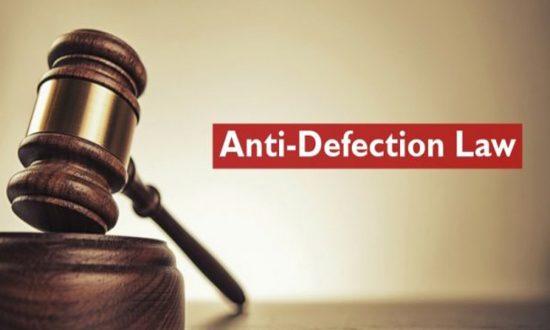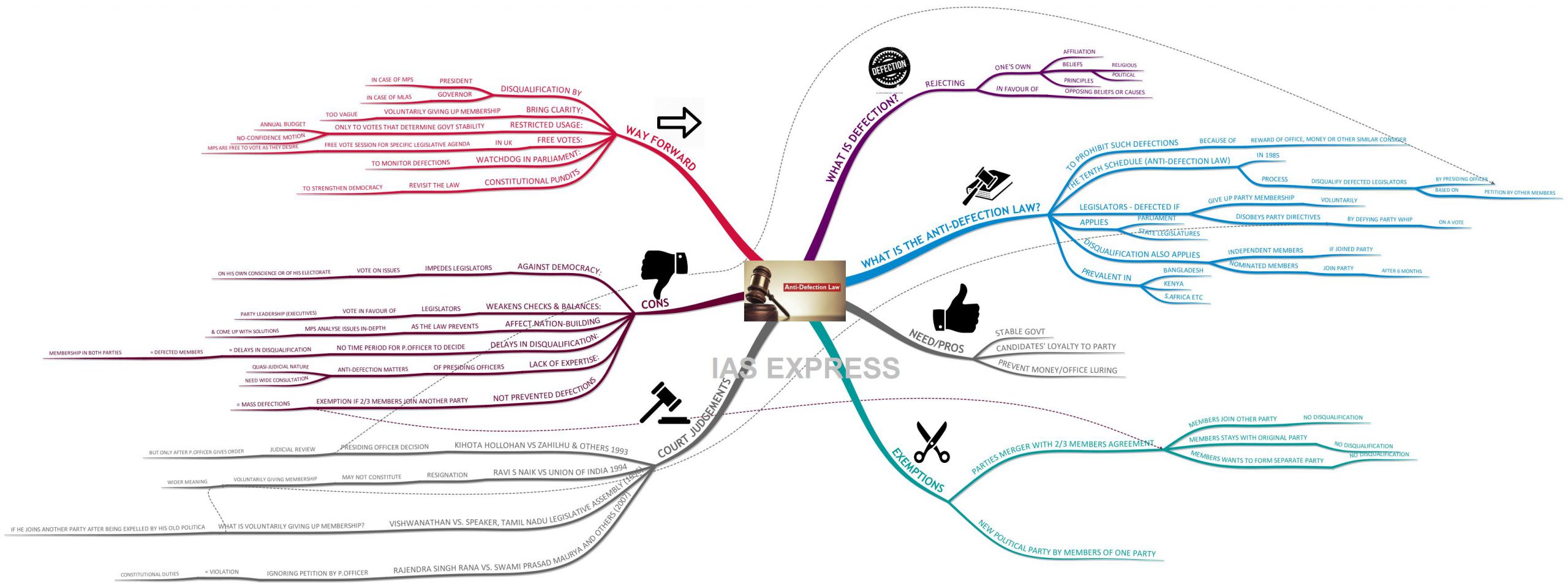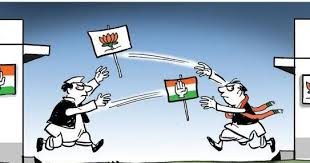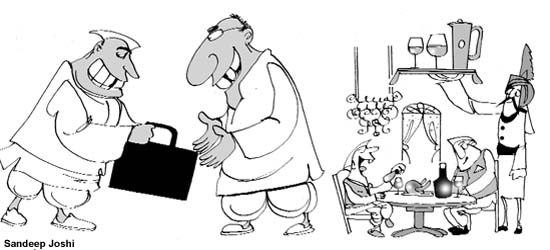The Anti-Defection Law / Tenth Schedule of Constitution – Explained

From Current Affairs Notes for UPSC » Editorials & In-depths » This topic
IAS EXPRESS Vs UPSC Prelims 2024: 85+ questions reflected
Recent desertions and defections in the Puducherry assembly have yet again highlighted the absurdity of the anti-defection law. Many MLAs from the treasury benches resigned, decreasing the numbers needed for a no-confidence motion to succeed in the Puducherry Assembly. This practice has also been seen recently in other states like Madhya Pradesh and Karnataka. Thus an MP (or MLA) has absolutely zero freedom to vote their judgement on any issue. They have to blindly follow what the party directs them to do so. This provision goes against the concept of representative democracy.
Therefore, the crucial step would be to review the Anti-Defection Law that made the institution less effective by affecting the independence of MPs/MLAs and removing any incentive for them to research and understand policies that have the bearing on the nation-building and development process.
What is defection?
Defection is the state of having rejected one’s own affiliation, religious or political beliefs, or principles often in favour of opposing beliefs or causes.
What is the Anti-Defection Law?
- Aaya Ram Gaya Ram (frequent floor-crossing by legislators) was a phrase that became popular in Indian politics after a Haryana MLA Gaya Lal changed his party thrice within the same day in 1967.
- The anti-defection law sought to prohibit such defections which may happen because of the reward of office, money or other similar considerations.
- The Tenth Schedule (Anti-defection law) was added in the constitution in 1985 which lays down the process by which legislators may be disqualified due to defection by the Presiding Officer of a legislature based on a petition filed by any other member of the House.
- A legislator is considered to have defected if he
- either give up the membership of his party voluntarily or
- disobeys the directives of the party leadership on a vote.
- It means that a legislator defying (refrain from voting or voting against) the party whip on any issue can lose his membership of the House. Note: A whip of the legislature ensures that members of the party attend and vote as the party leadership desires.
- Anti-defection law applies to both the Parliament and State Legislatures.
- Disqualification under anti-defection law also applies to independent and nominated members of the legislature.
- Independent members would be disqualified if they join a political party.
- Nominated members who are not members of a party; join a party after 6 months from the date of nomination, would be disqualified. In other words, they won’t get disqualified if they join a party within 6 months of nomination.
- Anti-defection law is not only prevalent in India but also in several other countries such as Bangladesh, Kenya, South Africa, etc.
What is the Need for the anti-defection law? / Merits
- Provides a stable government by making sure that legislators do not change sides.
- It ensures that candidates elected with party symbols and on the basis of party manifestos stay loyal to policies of the party.
- It enables political parties to prevent its members from voting for the lure of office or money by opposition parties.
What are the exemptions under the law?
Legislators may change their party without the risk of disqualification in certain circumstances.
- The law permits the party to merge with or into other party given that at least 2/3rd of its legislators should agree to the merger.
- In such a scenario, neither the members who agreed to merge nor the ones who stay with the original party will get disqualified.
- Members who chose neither options and wants to form a separate party from the time of such a merger are also exempted from disqualification.
- If a new political party created by the elected members of one party.
What are the important court judgements regarding anti-defection law?
Kihota Hollohon vs. Zachilhu and Others, 1993
- Issue: Whether presiding officer’s decision subject to judicial review?
- The law earlier mentioned that the decision of the Presiding officer is not subject to judicial review.
- This condition was removed by the Supreme Court in 1993 (Kihoto Hollohan Case) thus permitting appeals against the Presiding Officer’s decision in the High Court or the Supreme Court.
- But the Supreme Court maintained that there may not be any judicial intervention until the Presiding Officer gives his order.
Ravi S Naik vs. Union of India, 1994
- Issue: Whether resignation constitutes “voluntarily giving up membership” of a party?
- The SC interpreted the phrase ‘voluntarily gives up his membership’ and said that the phrase is not synonymous with ‘resignation’ and have a wider meaning.
- A person may voluntarily give up his membership of a political party even though he has not submitted his resignation from the membership of that party.
Vishwanathan vs. Speaker, Tamil Nadu Legislative Assembly (1996)
- Issue: What does it mean to be voluntarily giving up a membership?
- The Court stated that a member can be said to voluntarily give up his membership of a party if he joins another party after being expelled by his old political party.
Rajendra Singh Rana vs. Swami Prasad Maurya and Others (2007)
- Issue: Presiding officer failing to act on the petition.
- The SC stated that if the Speaker fails to act on a complaint, or accepts claims of splits or mergers without making a finding, he fails to act as per the Tenth Schedule.
- The Court said that ignoring a petition for disqualification is not merely an irregularity but a violation of constitutional duties.
What are the demerits of anti-defection law?
- Against democracy: It restricts a legislator from voting based on his conscience, judgement, and interests of his electorate on issues of national importance = against the democratic principle of the country.
- Weakens the system of checks & balances: It affects the oversight function of the legislature over the executive by making the members vote with respect to the decisions taken by the party leadership (Ministers) instead of his own conscience.
- Affect nation-building: The law does not provide an incentive for an MP or MLA to examine an issue in-depth before participating in the debate (as his view would lead to his disqualification if it opposes the party’s view) = affect nation-building or developmental process.
- Undue Delays in disqualification: The law does not specify a time period for the presiding officer to decide = unnecessary delays in acting against a member under the anti-defection law.
- Since courts cannot intervene until the presiding officer gives order = courts cannot question the delay by presiding officer.
- In certain cases, this delay in decision making has led to members, who have defected from their parties, continuing to be members of the House.
- There have also been instances where opposition members have been appointed ministers in the government while still holding the membership of their original parties in the legislature.
- Lack of Expertise: Presiding officers lacks expertise in deciding anti-defection cases which are quasi-judicial in nature and require wide consultations along with the opinion of experts.
- Not prevented defections due to Loopholes:
- The 10th schedule provides an exemption for disqualification if 2/3rd members agree to join another party = mass defection happens across the country.
- In 2016, the Arunachal Pradesh chief minister PemaKhandu, along with 43 MLAs defected from the Congress Party to join People’s Party of Arunachal.
- In recent years, opposition MLAs in some states like Andhra Pradesh and Telangana, have broken away in small groups gradually to join the ruling party. In some of these cases, more than 2/3rdof the opposition has defected to the ruling party.
What is the way forward?
- Disqualification by President/Governor: Instead of Presiding Officer, the decision to disqualify a member should be taken by the President (in case of MPs) or the Governor (in case of MLAs) on Election Commission’s advice. This would be similar to the disqualification of persons holding Office of Profit. It is because unlike British Parliament, where a Presiding officer is a non-party person, in India, Presiding Officer in the lower house (Speaker) must be the member of Ruling Party = there would be a conflict of interest in taking decisions disqualifying a person for defection.
- Bring clarity: The phrase “voluntarily giving up membership” is too vague and requires comprehensive revision.
- Restricted application: As suggested by Dinesh Goswami Committee and Law Commission, the law should apply only to votes that determine the stability of the government like the passage of the annual budget or no-confidence motion.
- Free votes: In the UK, parties sometimes announces a ” free vote” which means that for a specific legislative agenda, MPs are free to vote as they desire and are not controlled by whips issued by parties.
Politicians found loopholes in this law and have been utilising it for their own benefit. It is high time that a watchdog should be created in our Parliament and our constitutional pundits need to revisit this issue in order to counter the menace of corruption and defection which has worn away the values of democracy.
If you like this post, please share your feedback in the comments section below so that we will upload more posts like this.




